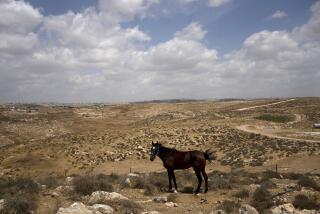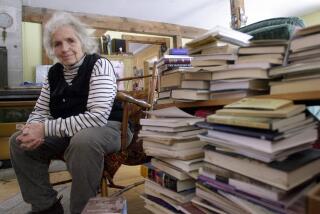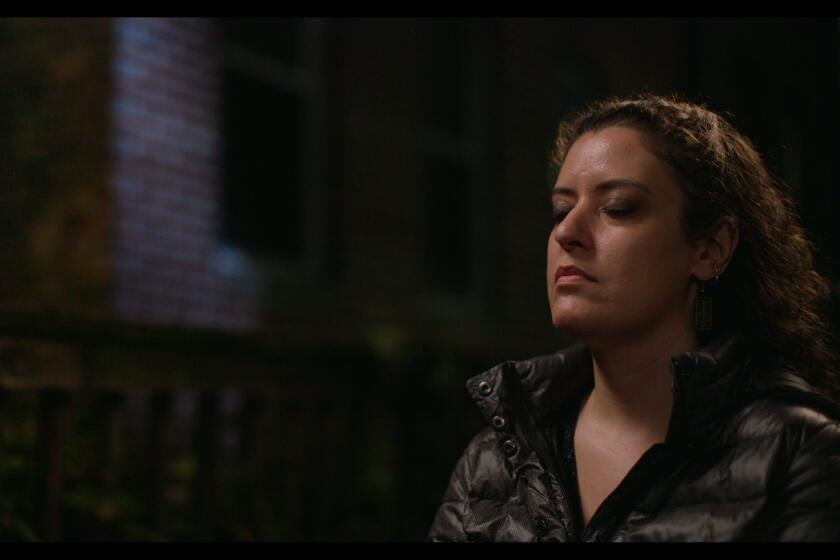Review: ‘The Settlers’ delves into Israeli politics and religion
As the devastating documentary “The Settlers” demonstrates, ask a simple question and you end up with a complex, confounding series of answers.
Veteran Israeli director Shimon Dotan poses the same basic query — “Are you a settler?” — to residents of the West Bank, and the range of responses is telling.
One person flat out refuses to answer. Another says, “I am in the land of my forefathers.” A third prefers the less judgmental word “inhabitant,” and a fourth sneers, “That’s how the media and leftists define me.” Only one man, his eyes ablaze with the joys of zealotry, says, “I am a settler, yes, I love this land, and I hope to be buried in it.”
Anyone with even a superficial interest in the Middle East knows about the settlers, the roughly 500,000 Israelis who live in violation of international law in 200-plus settlements in the midst of 2.7 million Palestinians and whose presence, depending on whom you ask, is either the biggest obstacle to peace in the region or the first step toward the world-changing arrival of the messiah.
Though many of today’s inhabitants are economic refugees who live where they do to escape the claustrophobia of Israel proper, the settlements did not start that way, which is where Dotan’s work comes in.
Smart, thorough and thoughtful, this disturbing film unfolds like a slow-motion nightmare that has taken half a century to fully reveal itself, a trenchant examination that deserves to stand next to compelling Israeli documentaries on similar themes, including “The Law in These Parts” and “The Gatekeepers.”
Though it’s far from the only film to deal with the phenomenon, “Settlers” stands out in terms of the substantial access it obtained to several generations of the movement’s leaders, allowing them to lay out religious/philosophical underpinnings in considerable detail. A few dissenting voices are heard, but mostly these people have the floor.
By doing that, “Settlers” also, in the words of Israeli journalist Akiva Eldar, makes it clear how and why Isreali politicians “didn’t see what we see now: a monster of half a million people standing in the way of peace.”
Broken into discreet segments, “Settlers” begins with a fiery May 1967 speech by influential Orthodox Rabbi Zvi Yehuda Kook, who spoke about the deep pain he’d felt 19 years earlier when the biblical land of Palestine had been partitioned by the United Nations.
When, just three weeks later, the Six Day War gave Israel possession of all that territory and more, including the West Bank, Rabbi Kook was looked on as a prophet.
His followers felt compelled as a religious imperative to colonize the newly occupied territory despite the fact that the Geneva Conventions specifically prohibited that kind of activity. By this definition, according to Hebrew University professor and peace advocate Moshe Halbertal, a settler is “a person who builds a house on land over which the state of Israel has no authority and where Palestinians have no rights.”
This mixture of politics and religion had far-reaching and toxic consequences. It meant that disagreement over politics was treated not as a difference of opinion but as a sin and that any government that did not agree with the religious establishment could be considered illegitimate. When democracy and Judaism clash, more than one leader says, Judaism has to triumph.
Hearing the settlement leaders, now often sporting long white beards, talk at length about what they accomplished, one is struck by how completely they believe that theirs is a mission mandated by God.
In fact, the late Rabbi Moshe Levinger, founder of the Jewish settlement in Hebron, is quoted as saying that once the messiah comes and peace is restored to the world, Palestinians will be grateful to the settlers for acting they way they did to make it happen.
If there is another through line in “Settlers” it’s how consistently Israel’s secular governments woefully underestimated the determination of their zealous religious brethren to act first and ask for permission later, leading to facts on the ground that proved impossible to reverse.
One of few Israelis to take on the settler movement was Prime Minister Yitzhak Rabin, who didn’t hesitate to call Gush Emunim, one of the leading settler organizations, “like a cancer on the democratic fabric of Israel.” Rabin was assassinated by an observant Jew associated with the movement.
Issues surrounding the West Bank settlements are so various and so complex that “The Settlers” can spare only a few minutes for some of them, including the help the groups get from American Evangelicals as well as the unmistakable racist contempt that is close to the surface or even above it among some of the interviewees.
The aspect of the film that got the most attention when it premiered in Israel was director Dotan’s ability to get interviews with members of the youthful extremists known as “hilltop youth” who see no reason why Israeli settlements shouldn’t extend even across international borders into the sovereign state of Jordan.
“Everything,” one young man says with a chilling air, “is temporary.”
Hopes for lasting peace in this part of the world, apparently, are the most temporary things of all.
----------------------
‘The Settlers’
MPAA rating: None
Running time: 1 hour, 50 minutes.
Playing: Laemmle’s Monica, Santa Monica.
See the most-read stories in Entertainment this hour »
Movie Trailers
More to Read
Only good movies
Get the Indie Focus newsletter, Mark Olsen's weekly guide to the world of cinema.
You may occasionally receive promotional content from the Los Angeles Times.










